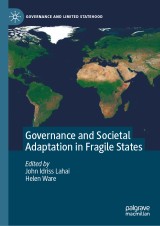Details

Governance and Societal Adaptation in Fragile States
Governance and Limited Statehood
|
96,29 € |
|
| Verlag: | Palgrave Macmillan |
| Format: | |
| Veröffentl.: | 09.06.2020 |
| ISBN/EAN: | 9783030401344 |
| Sprache: | englisch |
Dieses eBook enthält ein Wasserzeichen.
Beschreibungen
This book examines the various ways in which some fragile states in the Global South (or states with limited statehood) have adopted, and adapted to, processes of governance in their quests to address the socialized problems affecting their societies. It tells the story of these states’ resilience in the societal adaptation to a liberalized notion of governance. In addition to comparative case studies, the book also analyzes the engendered interplay of culture, economics, and politics in the creation of people-centric governance reforms. The contributing authors shed light on weak states’ often constructive engagement in the promotion of state governance under a variety of societal conditions, adverse or otherwise, and on their ability to remain resilient despite the complexities of the political and economic challenges they face.
Introduction.- The Realities of Governance: Conflict and Context across Africa.- State Institutions and the Consolidation of Popular Government in Nigeria.- Local institutional designs and reforms in Rwanda and Burundi.- Community-Based Organisations and the Development Agenda in Zimbabwe: The Case of Marange Development Trust, 2014-2017.- Framing Resilience and Adaptability: A Critical Discourse Analysis of ZANU PF Policy Texts in the Zimbabwean post-2000 Context.- Good Governance under Zuma Administration: Fad or Reality?.- Claiming the State: the political economy of social welfare access in rural South Africa.- Prospects for Linguistic and Cultural Diversity to Enhance African Political Governance.- The Struggles of adoption and adaptation in The Governance Space of Vanuatu: The Incorporation of Jifly authority and Kastom governance into the legal-rational system.
<p><b>Helen Ware</b> is a Professor of Development Practice at the University of New England, Australia. She is a former Australian ambassador to African countries (Angola and Namibia), human rights officer, and senior AusAID official.</p>
<p><b>John Idriss Lahai</b> is Research Fellow at the University of New England, Australia. He is former Policy Lead and Director of Research for several projects in sub-Saharan Africa for a consortium of USA/Australia-based research intensive universities.</p>
<p><b>John Idriss Lahai</b> is Research Fellow at the University of New England, Australia. He is former Policy Lead and Director of Research for several projects in sub-Saharan Africa for a consortium of USA/Australia-based research intensive universities.</p>
This book examines the various ways in which some fragile states in the Global South (or states with limited statehood) have adopted, and adapted to, processes of governance in their quests to address the socialized problems affecting their societies. It tells the story of these states’ resilience in the societal adaptation to a liberalized notion of governance. In addition to comparative case studies, the book also analyzes the engendered interplay of culture, economics, and politics in the creation of people-centric governance reforms. The contributing authors shed light on weak states’ often constructive engagement in the promotion of state governance under a variety of societal conditions, adverse or otherwise, and on their ability to remain resilient despite the complexities of the political and economic challenges they face.<br><div><br></div><div><p><b>Helen Ware</b> is a Professor of Development Practice at the University of New England, Australia. She is a former Australian ambassador to African countries (Angola and Namibia), human rights officer, and senior AusAID official.</p><p><b>John Idriss Lahai</b> is Research Fellow at the University of New England, USA. He is former Policy Lead and Director of Research for several projects in sub-Saharan Africa for a consortium of USA/Australia-based research intensive universities.</p></div>
Examines the various ways in which some fragile states in the Global South have adopted, and adapted to, processes of governance in their quests to address the socialized problems affecting their societies Analyzes the engendered interplay of culture, economics, and politics in the creation of people-centric governance reforms Sheds light on weak states’ often constructive engagement in the promotion of state governance under a variety of societal conditions
Diese Produkte könnten Sie auch interessieren:

Herausforderungen und Chancen eines künstlerischen Wettbewerbs für ein Mahnmal in Gedenken an die Opfer des 19. Februar 2020 in Hanau

von: Katharina Meyer zu Eppendorf

29,99 €

Der erste arabisch-israelische Krieg und seine Folgen für die Palästinenser

von: Dean Sánchez Pedregoso

15,99 €

Chinas Soft Power Strategien und dessen politische Entwicklung anhand der der Olympischen Spiele 2008 und 2022

von: Alexander Kuhn

15,99 €













